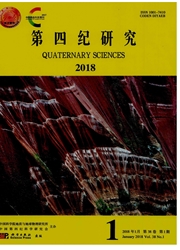

 中文摘要:
中文摘要:
以青藏高原东北缘断裂带为研究对像,对利用磷灰石裂变径迹热年代学对地震断层滑动摩擦生热的探测或测量进行了初步探讨。其基本思路是利用磷灰石裂变径迹热年代计的热敏感,通过对横跨断层垂直方向断层岩和围岩的磷灰石裂变径迹年龄及围限径迹长度分布的对比分析,对断层滑动摩擦生热进行探测。本次研究对来自3个断层剖面的13个样品进行了磷灰石裂变径迹分析,样品包括断层主滑动面上的断层泥、碎裂岩和断层围岩,分析结果并没有获得断层摩擦生热的证据,表明这些断层在地震滑动过程中的摩擦增温非常有限,没有达到磷灰石裂变径迹热年代计体系可加载热信息的温度-时间要求。结合前人已有的相关研究,对利用磷灰石裂变径迹热年代学对地震断层滑动摩擦生热进行探测或测量存在的主要问题及可行性进行了初步总结和探讨,认为只适应于对震级大、断层滑动距离和速率大,摩擦强度强,位于一定深度有大量摩擦热生成,并使断层附近增温达到或超过磷灰石裂变径迹部分或完全退火温度的断层进行滑动摩擦生热的探测或测量,将是一种潜在的能对地震断层滑动摩擦生热或增温进行测量的“热量计或温度计”。
 英文摘要:
英文摘要:
This paper focuses primarily on the application of apatite fission track thermochronology to the detection and/or measurement of fault-slip frictional heating. Due to the unique thermal sensitivity of the apatite fission track, apatite fission-track ages and confined track length distribution of samples within and adjacent to fault zones can reveal information of fault-slip frictional heating during individual earthquake fault-slip events. 13 samples were collected from the following 3 sections: The Dagoumen Section perpendicular to Haiyuan active fault, and the Xiaohonggou Section and Hongguliang Section perpendicular to Xiangshan-Tianjingshan active fault on the northeastern margin of Tibetan Plateau. Samples include fault gouges and ultracataclasites on principle slip planes of the faults, and ambient rocks adjacent to the faults. No localized thermal anomaly has been implied by fission track analysis. Samples from the Dagoumen Section show damaged apatite fission track system, caused by fault activities which resulted in very low U content of some samples. The results indicate that the magnitudes of frictional heat or increased temperature are too limited to cause annealing of apatite fission track. Based on this study and literature survey we conclude that apatite fission track thermochronology is only suitable for detecting and/or measuring frictional heat caused by large fault displacement and high strength friction which are generally caused by large earthquakes. Furthermore,this paper concludes that apatite fission track method would be a potential "calorimeter or thermometer" to detect and/or measure quantitatively the magnitude of fault-slip frictional heat generated by individual earthquake events.
 同期刊论文项目
同期刊论文项目
 同项目期刊论文
同项目期刊论文
 期刊信息
期刊信息
